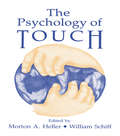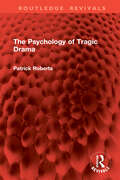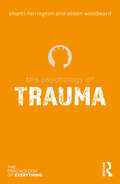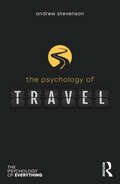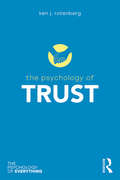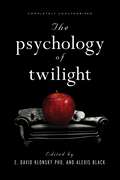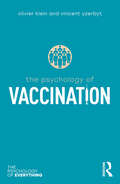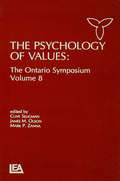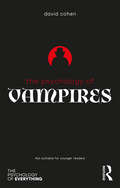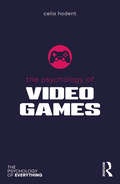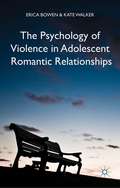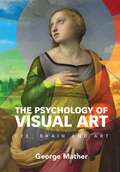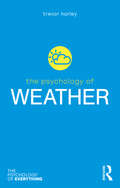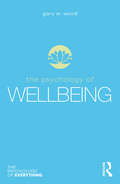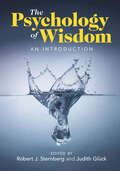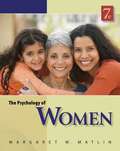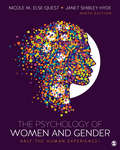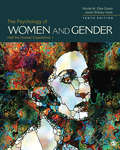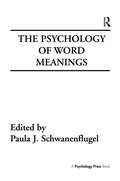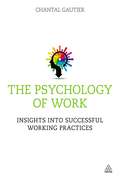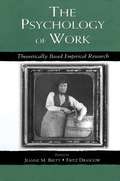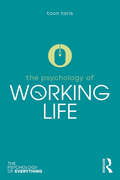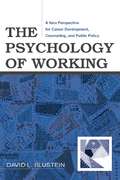- Table View
- List View
The Psychology of Touch
by Morton A. HellerDesigned to make research on touch understandable to those not specifically involved in tactile research, this book provides broad coverage of the field. It includes material on sensory physiology and psychophysics, thermal sensibility, pain, pattern participation, sensory aids, and tactile perception in blind people. While the volume is important for researchers in the area of touch, it should also prove valuable to a broad audience of experimental and educational psychologists, and health professionals. The book should also be of interest to scientists in perception, cognition, and cognitive science, and can be used as a supplementary reader for courses in sensation and perception.
The Psychology of Tragic Drama (Routledge Revivals)
by Patrick RobertsFirst published in 1975, The Psychology of Tragic Drama offers an interpretation of some of the themes of both ancient and modern tragic drama through an investigation of the plays in the light of psychoanalytical ideas.In his introduction, the author explains and defends the application of psychoanalytical insights to the study of literature. Then in the first part of the book, he proceeds to an exploration of some primitive and infantile situations expressed in Euripides’ Bacchae and in a group of modern dramas by Strindberg, Pinter, Ionesco and Weiss. In the second part he turns to the drama of Aeschylus, Sophocles and Euripides, tracing the psychological history of Orestes and Electra from their Greek originals to their later re-creations in more modern settings, in the plays of O’Neill, Eliot and Sartre, and comparing the treatment of themes and motifs which also reappear in Macbeth and Hedda Gabler. In conclusion, Patrick Roberts discusses the loss and gain involved in the diffused awareness among modern dramatists of psychoanalytical ideas and influence; indeed, the book as a whole stands as a confirmation and expansion of Freud’s comment ‘that poets and philosophers before me discovered the unconscious’. As such, it will appeal not only to all students of serious drama but to all those interested in the two disciplines of literature and psychoanalysis.
The Psychology of Trauma (The Psychology of Everything)
by Alison Woodward Shanti FarringtonWhat emotional, physical, and psychological effects might there be on those who have experienced traumatic events? How does neurodiversity, culture, and individual experience affect trauma responses? How can you support someone experiencing symptoms of trauma?The Psychology of Trauma integrates the knowledge and research from clinical practice and neuroscience to offer a scientific approach to understanding and managing symptoms of trauma. It debunks the myths and prejudices around trauma-informed therapy, shifting people’s view from ‘What’s wrong with you?’ to ‘What happened to you?’, and provides an overview of the different concepts and counselling approaches that are most suitable to support working with trauma. It also explores how neurodiversity, cultural differences, or social contexts affect the way we respond to any trauma.Using a trauma-informed framework, The Psychology of Trauma explores how clinical understanding can help family and community to support the journey of recovery It provides an overview of key aspects around trauma-informed practices and principles whilst shining a light on new and emerging treatments for trauma.
The Psychology of Travel (The Psychology of Everything)
by Andrew StevensonWhy do we travel? Are holidays good for our health? What are the social and psychological factors that drive us to move? The Psychology of Travel provides an eclectic introduction to the range of travel experiences from commuting, to going on holiday, to studying abroad. Travel is a near-universal experience and manifests itself in various forms, from everyday experiences to exotic adventure, although it varies across time and cultures. The book unpacks the concept of travel, and engages with topics including migration, wellbeing, acculturation, wayfinding, slow travel, place attachment and nostalgia, and brings them into sharp focus in relation to globalisation and climate change, By asking what drives us to journey and offering key insights into the psychological factors behind different kinds of travel, The Psychology of Travel introduces the reader to new ways of thinking about global mobility and movement.
The Psychology of Trust (The Psychology of Everything)
by Ken J. RotenbergWhat makes us trust people? How is trust developed and maintained? Is Western society facing a crisis of trust? The Psychology of Trust addresses trust issues that are directly relevant to peoples’ experiences in their daily lives. It identifies the factors that cause people to trust, and the consequences of trust for real world issues in health, politics, terrorism, the workplace, and religious faith. It also explores the impact of a lack of trust, and what causes distrust of individuals, groups and organisations. In a world where trust impacts our daily lives, The Psychology of Trust shows the role trust plays in our relationships, and provides practical guidance regarding our own trust in others.
The Psychology of Twilight
by David A. FrederickYou've read the books. You've seen the films. Now get inside the heads of your favorite Twilight characters (just like Edward can!) in The Psychology of Twilight. Explore the minds and motives of Bella, Edward, Jacob, and more with a deeper look at the series that's captured the hearts—and psyches—of millions. Find out: How Edward and Jacob match up in an evolutionary psychology smackdown for Bella's—and our—affection Whether Bella's motorcycle-riding and cliff diving in New Moon are suicidal—or her salvation Why vampires and werewolves aren't so different after all (at least psychologically) The emotional appeal of love stories like Bella and Edward's Why being a part of Twilight fandom is good for your psychological health Snuggle up on the closest chaise, and get ready to revisit the Twilight Saga—with some professional help.
The Psychology of Vaccination (The Psychology of Everything)
by Vincent Yzerbyt Olivier KleinWhy do some people choose to be vaccinated and others do not? What is the difference between vaccine hesitancy and anti-vaccinism? What can social psychology tell us about attitudes towards vaccination?The Psychology of Vaccination identifies the social psychological drivers of vaccine mindsets, to explore why some people choose to be vaccinated, some are hesitant, and others refuse. It explores the socio-demographic factors related to vaccine hesitancy and considers the role of motivation in making this health decision. The book focuses on how individuals are social beings, inserted into a web of influences that guide their behaviour, and considers the impact this may have on their health choices.Not only aimed at the convinced, but also for all those who have doubts about vaccination, The Psychology of Vaccination offers an insightful look at our health behaviours and considers whether it is possible to affect health behaviour change.
The Psychology of Values: The Ontario Symposium, Volume 8 (Ontario Symposia on Personality and Social Psychology Series #Vol. 8)
by James M. Olson Mark P. Zanna Clive SeligmanThe eighth Ontario Symposium brought together an international group of scholars who work in the area of the psychology of values. Among the categories these experts address are the conceptualizations of values, value systems, and value-attitude-behavior relations; methodological issues; the role of values in specific domains, such as prejudice, commitment, and deservingness; and the transmission of values through family, media, and culture. Each chapter in the volume illustrates both the diversity and vitality of research on the psychology of values.
The Psychology of Vampires (The Psychology of Everything)
by David CohenWhy have vampires become such a feature of modern culture? Can vampire-like conditions be explained by medical research? Is there a connection between vampirism and Freud? The Psychology of Vampires presents a captivating look at the origins of vampires in myth and history, and the psychological theories which try to explain why they fascinate us. It traces the development of vampires from the first ever vampire tale, written by John Polidori in 1819, to their modern cultural legacy. Together with historical detail about Polidori’s eventful life, the book also examines the characteristics of vampires, and explores how and why people might identify as vampires today. From sanguinarians who drink blood, to psychic vampires who suck the energy from those around them, The Psychology of Vampires explores the absorbing connections between vampirism and psychology, theology, medicine and culture.
The Psychology of Video Games (The Psychology of Everything)
by Celia HodentWhat impact can video games have on players? How does psychology influence video game creation? Why do some games become cultural phenomena? The Psychology of Video Games explores the relationship between psychology and video games from the perspective of both game developers and players. It looks at how games are made and what makes them fun and successful, the benefits gaming can have on players in relation to education and healthcare, concerns over potential negative impacts such as pathological gaming, and ethics considerations. With gaming being one of the most popular forms of entertainment today, The Psychology of Video Games shows the important role played by an understanding of the human brain and its mental processes in the development of ethical and inclusive video games.
The Psychology of Violence in Adolescent Romantic Relationships
by Kate Walker Erica BowenDomestic violence in adolescent romantic relationships is an increasingly important and only recently acknowledged social issue. This book provides conceptual frameworks for the design and evaluation of interventions with a focus on developing evidence based practice, as well as a research, practice and policy agenda for consideration.
The Psychology of Visual Art
by George MatherWhat can art tell us about how the brain works? And what can the brain tell us about how we perceive and create art? Humans have created visual art throughout history and its significance has been an endless source of fascination and debate. Visual art is a product of the human brain, but is art so complex and sophisticated that brain function and evolution are not relevant to our understanding? This book explores the links between visual art and the brain by examining a broad range of issues including: the impact of eye and brain disorders on artistic output; the relevance of Darwinian principles to aesthetics; and the constraints imposed by brain processes on the perception of space, motion and colour in art. Arguments and theories are presented in an accessible manner and general principles are illustrated with specific art examples, helping students to apply their knowledge to new artworks.
The Psychology of Weather (The Psychology of Everything)
by Trevor HarleyDo you feel happier on a sunny day? Are you afraid of thunderstorms? Are you dreaming of a White Christmas? The Psychology of Weather explores our relationship with the weather, and how it can affect our mood, behaviour, and lifestyle. The book sheds light on our preoccupation with this natural phenomenon, providing insights into how the weather on the day we were born can directly affect our intelligence and personality, and explore such surprising findings that suicide rates peak in the spring and summer. When the weather affects everything from our buying behaviour, to the jobs we do, The Psychology of Weather shows us that understanding and appreciating the weather can improve our well-being and contribute to human survival.
The Psychology of Wellbeing (The Psychology of Everything)
by Gary W. WoodHow can we improve our sense of wellbeing? What explains the current wellbeing boom? What does wellbeing mean to you? The Psychology of Wellbeing offers readers tools to navigate their own wellbeing and understand what makes a ‘good life’. Using self-reflection and storytelling, it explores how trust affects psychological and emotional wellbeing, considers how stress and inequality impact our psychological wellbeing, and how trends such as positive psychology influence our understanding of happiness. In a world where the ‘wellness economy’ is big business, The Psychology of Wellbeing shows how we can question and make sense of information sources, and sheds light on the wellness, self-care and self-help industry.
The Psychology of Wisdom: An Introduction
by Robert J. Sternberg Judith GlückThe Psychology of Wisdom: An Introduction is the first comprehensive coursebook on wisdom, providing an engaging, balanced, and expert introduction to the psychology of wisdom. It provides a comprehensive and up-to-date account of the psychological science of wisdom, covering wide-ranging perspectives. Each chapter includes extensive pedagogy, including a summary, a glossary, bolded terms, practical applications, discussion questions, and a brief description of the authors' research. Topics include the philosophical foundations, folk conceptions, and psychological theories of wisdom; relations of wisdom to morality and ethics, to personality and well-being, to emotion; wisdom and leadership, wisdom and social policy. These topics are covered in a non-technical, bias-free, and student-friendly manner. Written by the most eminent experts in the field, this is the definitive coursebook for undergraduate and graduate students, as well as interested professionals and researchers.
The Psychology of Women (Seventh Edition)
by Margaret W. MatlinThis highly respected, best-selling book offers an enjoyable, extraordinarily well-written introduction to the psychology of women. Appropriate for readers from a wide variety of backgrounds, this comprehensive book depicts women's experiences through direct quotations and an emphasis on empirical research. Known for its balance of scholarship, readability, and inclusion of various kinds of women, the text reflects a genuine interest in and understanding of the readers for whom it was written. THE PSYCHOLOGY OF WOMEN includes a chapter on old age as well as discussions of topics such as welfare issues, pregnancy, and women's retirement, which are central in many women's lives but not consistently covered in other texts.
The Psychology of Women and Gender: Half the Human Experience +
by Janet Shibley Hyde Nicole M. Else-QuestWith clear, comprehensive, and cutting-edge coverage, The Psychology of Women and Gender: Half the Human Experience + delivers an authoritative analysis of classical and up-to-the-minute research from a feminist, psychological viewpoint. Authors Nicole M. Else-Quest and Janet Shibley Hyde examine the cultural and biological similarities and differences between genders, noting how they are often a result of inequality. The Ninth Edition emphasizes rigorous methodology and reviewing and evaluating empirical evidence, helping demystify the scientific process in this field of study. Hands-on applications through case studies that integrate research from other disciplines give students further experience with key issues. This proven resource equips readers with a strong foundation for understanding the dynamic influences of gender, sexual orientation, and ethnicity in the context of psychology and society, along with strategies for thinking critically about popular culture and using psychological science to improve people’s lives and promote gender equality.
The Psychology of Women and Gender: Half the Human Experience +
by Janet Shibley Hyde Nicole M. Else-QuestWith clear, comprehensive, and cutting-edge coverage, The Psychology of Women and Gender: Half the Human Experience + delivers an authoritative analysis of classical and up-to-the-minute research from a feminist, psychological viewpoint. Authors Nicole M. Else-Quest and Janet Shibley Hyde examine the cultural and biological similarities and differences between genders, noting how they are often a result of inequality. The Ninth Edition emphasizes rigorous methodology and reviewing and evaluating empirical evidence, helping demystify the scientific process in this field of study. Hands-on applications through case studies that integrate research from other disciplines give students further experience with key issues. This proven resource equips readers with a strong foundation for understanding the dynamic influences of gender, sexual orientation, and ethnicity in the context of psychology and society, along with strategies for thinking critically about popular culture and using psychological science to improve people’s lives and promote gender equality.
The Psychology of Women and Gender: Half the Human Experience +
by Janet Shibley Hyde Nicole M. Else-QuestA psychology of women textbook that fully integrates transgender research, issues, and concerns With clear, comprehensive, and cutting-edge coverage, The Psychology of Women and Gender: Half the Human Experience + delivers an authoritative analysis of classical and up-to-date research from a feminist, psychological viewpoint. Authors Nicole M. Else-Quest and Janet Shibley Hyde examine the cultural and biological similarities and differences between genders, noting how these characteristics can affect issues of equality. Students will come away with a strong foundation for understanding the dynamic influences of gender, sexual orientation, and ethnicity in the context of psychology and society. The Tenth Edition further integrates intersectionality throughout every chapter, updates language for more transgender inclusion, and incorporates new content from guidelines put forth from the American Psychological Association.
The Psychology of Women and Gender: Half the Human Experience +
by Janet Shibley Hyde Nicole M. Else-QuestA psychology of women textbook that fully integrates transgender research, issues, and concerns With clear, comprehensive, and cutting-edge coverage, The Psychology of Women and Gender: Half the Human Experience + delivers an authoritative analysis of classical and up-to-date research from a feminist, psychological viewpoint. Authors Nicole M. Else-Quest and Janet Shibley Hyde examine the cultural and biological similarities and differences between genders, noting how these characteristics can affect issues of equality. Students will come away with a strong foundation for understanding the dynamic influences of gender, sexual orientation, and ethnicity in the context of psychology and society. The Tenth Edition further integrates intersectionality throughout every chapter, updates language for more transgender inclusion, and incorporates new content from guidelines put forth from the American Psychological Association.
The Psychology of Word Meanings (Cog Studies Grp of the Inst for Behavioral Research at UGA)
by Paula J. SchwanenflugelThis volume contains perspectives from a collection of cognitive scientists on the psychological, philosophical, and educational issues surrounding the meanings of words and how these meanings are learned and accessed. It features chapters covering the nature and structure of word meaning, how new word meanings are acquired in childhood and later on in life, and how research in word processing may tell us something about the way in which word meanings are represented and how they relate to the language processor.
The Psychology of Work
by Chantal GautierThe Psychology of Work integrates psychological theory with personal narrative from global industry leaders, as well as those entering the workforce, to offer tangible insights into the real world of work. It is ideal for students, professionals and anyone with an interest in how successful organizations operate. It charts the development of the field of organizational psychology and provides the key theoretical frameworks. Crucially, it explores how these can be utilised to enhance organizational culture, and why this is so relevant and important in the modern workplace.Through the inclusion of interviews with students, The Psychology of Work reveals what the future workforce expect of the organizations that they are going in to and encourages students reading the book to reflect on what kind of leaders they would like to be. The book is also a valuable resource to support professionals and practitioners, highlighting current working practices and the need for change, offering practical guidance on how to bring the 'humane' back into organizational life.
The Psychology of Work: Theoretically Based Empirical Research (Organization and Management Series)
by Jeanne M. Brett Fritz DrasgowThis edited volume is derived from a conference held in honor of Charles Hulin's contribution to the psychology of work. His research has carefully developed and tested theory related to job satisfaction, withdrawal from work, and sexual harassment. Edited by Hulin's students, The Psychology of Work discusses research in job satisfaction. This research shows that job satisfaction plays an essential role in theories of organizational behavior. Formal models are used, such as item response theory, structural equation modeling, and computational models. Three general and consistent themes in Hulin's research are represented in this book's chapters. The first theme is a focus on broad, general constructs, such as job satisfaction. The virtue of this approach is that a wide range of behavior can be explained by a small number of variables. The second theme involves the examination of the antecedents and consequences of job satisfaction. This theme is increasingly important because it ties research on job attitudes and job behaviors where links are consistently found to social attitudes and behaviors where links are rarely found. The third theme consists of Hulin's interest in the use of formal models to characterize and understand behavior. This volume will be of interest to scholars and students in industrial/organizational psychology, human resources, organizational behavior, and management.
The Psychology of Working Life (The Psychology of Everything)
by Toon W. TarisWhat motivates us to do a good job? When does the pressure of work impact upon our health and well-being? How can employers choose the right candidates? The Psychology of Working Life shows how, whether we like it or not, the way we work, and our feelings about it, play a fundamental role in overall well-being. From the use of psychometrics in recruiting the right candidate, to making working life more efficient, the book illustrates how work in industrialized societies continues to be founded upon core psychological ideas. Motivation and job satisfaction have become recognized as key to job design and The Psychology of Working Life suggests that changing the way we work can impact on our stress levels, overall health, and productivity.
The Psychology of Working: A New Perspective for Career Development, Counseling, and Public Policy (Counseling and Psychotherapy)
by David BlusteinIn this original and major new work, David Blustein places working at the same level of attention for social and behavioral scientists and psychotherapists as other major life concerns, such as intimate relationships, physical and mental health, and socio-economic inequities. He also provides readers with an expanded conceptual framework within which to think about working in human development and human experience. As a result, this creative new synthesis enriches the discourse on working across the broad spectrum of psychology's concerns and agendas, and especially for those readers in career development, counseling, and policy-related fields. This textbook is ideal for use in graduate courses on counseling and work or vocational counseling.
